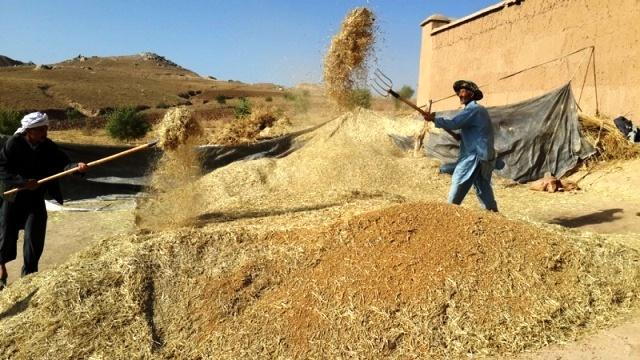NILI (Pajhwok): Amid claims of bumper wheat crop in central Daikundi province, it is feared that the wheat product would not meet locals’ demand as its prices were going higher.
Provincial agriculture and livestock officials said this year wheat production stood at 54,000 metric tons as 30,000 hectares of farmland and 2,900 hectares of rain-fed land was cultivated.
In 2013, the wheat crop yielded only 38,000 metric tons. Agriculture director, Mahdi Mohadi linked the bumper wheat crop to timely rains but he said this wheat crop for 450,000 population of the province was not enough. He added 270,000 tons of wheat was required to meet locals’ need.
Mohadi told Pajhwok Afghan News that “lack of proper farmlands, improper weather and lack of rain and heavy snowfall are the main causes to bring lower the wheat crop.”
He said distribution of improved seeds and fertilizers to farmers by cooperative organizations was also a cause for improved products of wheat.
Mohammad Ali, a farmer from Nili, the provincial capital, said the yield of his land was 1,400 kilograms this year as compared to 110 kilograms in 2013.
But he said despite the increased level of crops, he would buy more wheat to meet his family need.
Ali added that he has kept some wheat stock to use as seed for the next year. He also asked government organizations to continue their support to farmers in distributing them improved seeds and fertilizers so that the farmers would have better crops.
Juma Karbalai, a farmer from Nili city, was happy about the increased amount of his wheat crops but said that amount of his crops could get more if his farm was not affected by loose smut disease.
Karbalai said his wheat crops this year reached to more than 700 kilograms while the amount last year stood at 490 kilograms.
The price of seven kilograms of wheat was 130 afghanis to 150 afghanis last year but the same now ranges between 160 to 220 afghanis.
A dweller of Nili, Mohammad Abbas said: “I am a guard in a school and my salary is only 4,000 afghanis. It is very difficult to afford wheat with such a high price.”
mds/rm








GET IN TOUCH
NEWSLETTER
SUGGEST A STORY
PAJHWOK MOBILE APP